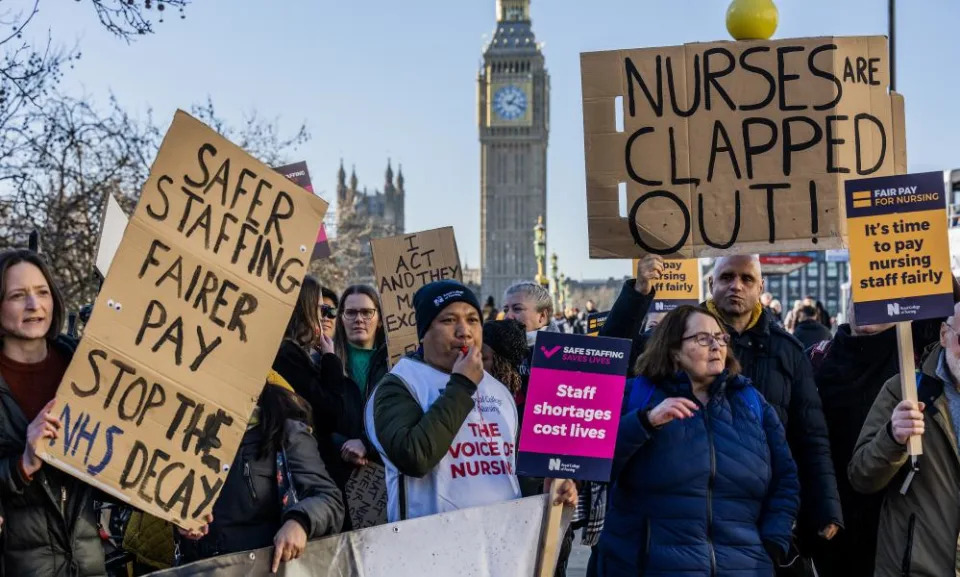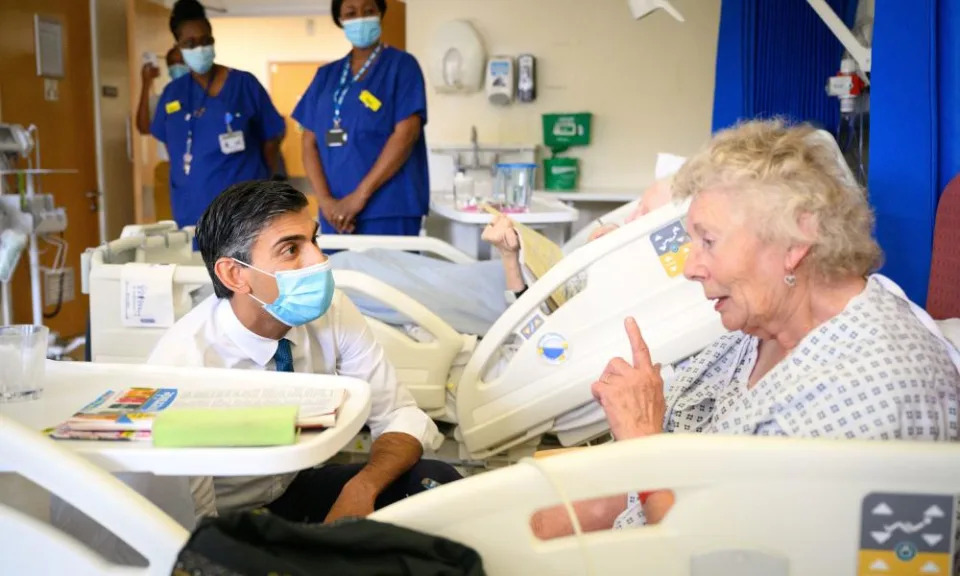Denis Campbell, Kiran Stacey and Rachel Hall
Mon, 6 February 2023

Photograph: Guy Bell/Rex/Shutterstock
A health union leader has described Rishi Sunak as deluded for suggesting NHS staff should abandon their campaign to secure a bigger pay rise this year.
The GMB’s national secretary, Rachel Harrison, made the remark in response to Downing Street’s insistence that it would not talk about improving the £1,400 pay award for frontline personnel for 2022/23 even though it has triggered the wave of NHS strikes.
The spat blew up on Monday, the day tens of thousands of nurses and ambulance staff staged an unprecedented joint stoppage in the biggest strike in NHS history.
The prime minister’s official spokesperson said Sunak wanted to look ahead to the pay deal for 2023/24 and “not backwards”.
Asked what the government’s plan for ending the escalating series of walkouts was, the spokesperson reiterated its position that large pay rises risked fuelling already rampant inflation.
“But we do want to find a path forward. We think the right way to do that is to talk about this year’s [2023/24] pay offer prior to evidence being submitted to the pay review body.”
Pressed on whether unions should “give up hope” of negotiating on pay levels for 2022/23, the No 10 official said: ‘I think we would say we want to keep talking about ways forward.”
Unions responded furiously and accused Sunak of trying to ignore the key reason for nurses, ambulance staff and paramedics staging stoppages since 15 December.
“GMB ambulance workers and other health workers are on strike over this year’s pay. Ignoring their calls and kicking the can into next year’s pay does nothing to solve the current dispute,” Harrison said.
“If he thinks GMB members will be fobbed off by pretending this year’s cost of living crisis hasn’t happened, he’s deluded.”
The health minister, Maria Caulfield, who used to be an NHS cancer nurse, reiterated the government’s line. She said: “We’ve been pretty clear that we’re not going to look at the current year’s pay award.”
One union official said: “Simply saying ‘forwards not backwards’ is just nonsense. Unions made very clear to the health secretary, Steve Barclay, when we met him last month that there has to be movement on NHS pay now or that strikes will continue, possibly for months.”
Unison’s head of health, Sara Gorton, said: “Under the Westminster government’s watch, it’s NHS pay that’s gone backwards. Health workers are on strike to improve pay and staffing this year. Talking about the wage rise they’re due in April won’t end the dispute.”
Both unions urged Sunak to follow the more proactive approach taken by the Scottish National party and Labour devolved administrations in Scotland and Wales. Both governments have offered NHS staff significantly more than Barclay’s £1,400 in an effort to break the deadlock.
Unions in Wales called off planned strikes last week after the Cardiff government offered staff an extra 3% over and above the £1,400, which equates to a rise of about 4% for many staff. Only half of the 3% would increase base salaries though. The other 1.5% would be a one-off payment.
The Labour leader, Keir Starmer, accused ministers of doing nothing to settle the dispute. Many people would be “absolutely flabbergasted that the government is still sitting this one out, not showing any leadership in the middle of a cost of living crisis, making the situation much worse than it otherwise would be”, he said.
The chief executive of King’s College hospital NHS trust in London, Prof Clive Kay, said that walkouts last month by nurses, ambulance crews and paramedics had forced it to reschedule 431 non-urgent operations and 938 outpatient appointments.
Related: Deadlock over NHS pay putting patients in danger, chief nurses warn
Referring to the fact that the NHS in England would be hit by stoppages every day this week except Wednesday, he said: “This week’s strike action is likely to have a similar impact, which is why we would urge all parties to find a way forward as quickly as possible.
“We support the right of nurses to take strike action, and to date we have been able to continue delivering life-preserving and emergency care on the strike days.
“However, the longer the strikes continue, the harder it becomes for our teams to deliver the care they want to, and sadly, this will have an impact on patients, many of whom have been waiting a long time for treatment as a result of the pandemic.”
In an urgent question debate on the strikes in the Commons on Monday, Conservative MPs largely backed the government’s refusal to discuss this year’s pay settlement with unions. But Steve Brine, the Tory chair of the health select committee, urged ministers to speed up the NHS pay review process for next year, which he believes could help bring an end to the current dispute.
The Guardian view on Rishi Sunak’s NHS plans: ramping up private medicine
Editorial
Mon, 6 February 2023

Photograph: Leon Neal/PA
Last October, Rishi Sunak sat down beside Catherine Poole, a 77-year-old patient at Croydon University hospital, no doubt hoping for a breezy on-camera conversation. When Mr Sunak asked whether staff had looked after her “really nicely”, Ms Poole replied: “They always do. It’s a pity you don’t pay them more.” That sentiment seems to have hardened. Health workers in Britain began their largest strike on Monday and polls showed the public solidly behind them.
The disputes will eventually be settled, but patients will suffer more the longer they go on. Yet it seems that Mr Sunak’s government is in no mood to end the quarrel. That is why Monday’s strike, the biggest in the 75-year history of the NHS, largely affected English health services. Walkouts have been suspended in Scotland and Wales after new pay offers. Ministers need to face up to reality. The NHS in England is in crisis. This might lend weight to the argument that the system is in crying need of correction, yet the health service in England was just reorganised under the Health and Care Act 2022 so that the NHS could plan “integrated” services – reversing a decade of pro-market reforms.
Hugh Alderwick of the Health Foundation wrote perceptively last month that “these changes were introduced under Boris Johnson’s government. Two prime ministers later, Rishi Sunak and his health secretary, Steve Barclay, are emphasising patient choice of provider … to improve the NHS”. The Health Foundation’s polling shows that while public satisfaction in the health system has declined because of waiting times, support for its core principles – free at the point of use, available to everyone and funded by tax – remains as strong as ever.
This faith in the egalitarian and redistributive health system is being tested by Mr Sunak’s parsimony. Overall health spending will now grow by 1.2% a year in real terms over the next two years – less than in the decade before the pandemic (2% a year) and less than a third of the long term average (3.8%). With the NHS unable to provide comprehensive cover, the private sector is moving in. Last year, in the richest parts of the UK, a quarter of all NHS elective care was being delivered by private providers. In the poorest areas, the proportion is more than a tenth.
If wealthier areas see the biggest reductions in waiting times, then it would be another example of inverse care law – where health provision varies inversely with the need of the population served. Having to wait for care encourages people to try to jump the queue. In his forthcoming book, Shattered Nation, Oxford University’s Danny Dorling calculates that in 1980, about 0.5% of GDP was spent on private health insurance. In 2021 it was more than 2%.
Health spending is rising because we are living longer and there are more people with long-term conditions. It is also going up because medical advances allow us to live healthier and longer lives. Prof Dorling says that from the 1970s to 2015, people in 20 countries had longer life expectancy than Britons. By 2021 that was true in more than 30 nations. He argues that this “disturbing and sudden fall was not due to the pandemic; it was due to austerity”. It makes sense to spend money on things that improve our existence – unless, it seems, you are a Conservative minister.
Editorial
Mon, 6 February 2023

Photograph: Leon Neal/PA
Last October, Rishi Sunak sat down beside Catherine Poole, a 77-year-old patient at Croydon University hospital, no doubt hoping for a breezy on-camera conversation. When Mr Sunak asked whether staff had looked after her “really nicely”, Ms Poole replied: “They always do. It’s a pity you don’t pay them more.” That sentiment seems to have hardened. Health workers in Britain began their largest strike on Monday and polls showed the public solidly behind them.
The disputes will eventually be settled, but patients will suffer more the longer they go on. Yet it seems that Mr Sunak’s government is in no mood to end the quarrel. That is why Monday’s strike, the biggest in the 75-year history of the NHS, largely affected English health services. Walkouts have been suspended in Scotland and Wales after new pay offers. Ministers need to face up to reality. The NHS in England is in crisis. This might lend weight to the argument that the system is in crying need of correction, yet the health service in England was just reorganised under the Health and Care Act 2022 so that the NHS could plan “integrated” services – reversing a decade of pro-market reforms.
Hugh Alderwick of the Health Foundation wrote perceptively last month that “these changes were introduced under Boris Johnson’s government. Two prime ministers later, Rishi Sunak and his health secretary, Steve Barclay, are emphasising patient choice of provider … to improve the NHS”. The Health Foundation’s polling shows that while public satisfaction in the health system has declined because of waiting times, support for its core principles – free at the point of use, available to everyone and funded by tax – remains as strong as ever.
This faith in the egalitarian and redistributive health system is being tested by Mr Sunak’s parsimony. Overall health spending will now grow by 1.2% a year in real terms over the next two years – less than in the decade before the pandemic (2% a year) and less than a third of the long term average (3.8%). With the NHS unable to provide comprehensive cover, the private sector is moving in. Last year, in the richest parts of the UK, a quarter of all NHS elective care was being delivered by private providers. In the poorest areas, the proportion is more than a tenth.
If wealthier areas see the biggest reductions in waiting times, then it would be another example of inverse care law – where health provision varies inversely with the need of the population served. Having to wait for care encourages people to try to jump the queue. In his forthcoming book, Shattered Nation, Oxford University’s Danny Dorling calculates that in 1980, about 0.5% of GDP was spent on private health insurance. In 2021 it was more than 2%.
Health spending is rising because we are living longer and there are more people with long-term conditions. It is also going up because medical advances allow us to live healthier and longer lives. Prof Dorling says that from the 1970s to 2015, people in 20 countries had longer life expectancy than Britons. By 2021 that was true in more than 30 nations. He argues that this “disturbing and sudden fall was not due to the pandemic; it was due to austerity”. It makes sense to spend money on things that improve our existence – unless, it seems, you are a Conservative minister.
No comments:
Post a Comment